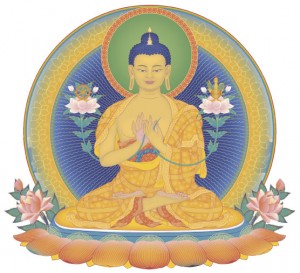Buddhism and Marxism: persecutions in Tibet,
USSR, Mongolia, Cambodia/Kampuchea - and the evangelical aftermath.
Marxism originated as a nineteenth century form of materialism
(to its adherents it was known as dialectical materialism), which
unfortunately persisted too long into the 20th century.
The adjective 'dialectical' doesn't just refer to the fact that Marxists tended to talk in
a jargon which was unintelligible to speakers of the standard version of the language.
'Dialectical' derives from a Greek word meaning 'debate' or 'discussion' - although such
activities were notably rare under Marxist governments.
Marxism was intolerant of other belief systems, especially religions, which it regarded
as the 'opium of the masses'. In Marxist countries most religions were suppressed to
a greater or lesser extent, Buddhism being a particular object of persecution. The reason
for this is fairly clear, for unlike the other belief-systems that Marxism encountered,
Buddhism was the only one which offered a rational, logically
coherent philosophy, and thus presented a real ideological threat to the Marxist
materialist worldview.
Marxism could only hang on to power in a totalitarian state where it controlled all
information. It disintegrated in Eastern Europe and the USSR during the late
1980's, as the increased personal use of phones, PCs and photocopiers undermined its
information monopoly.
Tibet
Marxism still exists in a confused and degenerate form as Chinese communism, and both
Chinese dissidents and the Buddhist people of Chinese-occupied Tibet
continue to suffer severe repression for their beliefs.
In Tibet over a million people have been murdered since the occupation began in
1959. Atrocities continue unabated - torture, summary execution and imprisonment
without trial are still commonplace. There is an official policy of genocide - enforced
sterilisations and abortions are being carried out in ever increasing numbers on Tibetan
women. Almost all Tibet's monasteries have been reduced to ruins (see links to pictures on Tibet page) and their libraries of ancient books destroyed.
Russia
It is not generally known in the West, but the pre-revolutionary Russian Empire had a
substantial number of Buddhists who practised in the Tibetan tradition. These people
were allowed religious freedom by the Tsarist government and established temples and
monasteries, chiefly in Central Asia and Siberia. In the 1920's, as Joseph Stalin
consolidated his power, most of the temples and monasteries were destroyed, and many the
Soviet Buddhists were executed or worked to death in the notorious Gulags. Pockets
of believers survived in the remote regions of Buryatia, the Kalmyck Republic and Tuva. A
strong revival is now underway, as the number of Russian Buddhist websites testifies (see Russia for links).
Mongolia
At the beginning of the twentieth century Mongolia was a predominantly Buddhist country
practising in the Tibetan Gelug tradition, but the usual relentless persecution started
soon after the communists took over. Fortunately, Marxism dissappeared from Mongolia at about the same time as it collapsed in the USSR and
Eastern Europe. The new climate of freedom allowed religious observance, but the
Buddhist tradition had been seriously weakened with only a very few old monks having
survived. Attempts are currently being made to re-establish the Dharma with Tibetan
assistance, but there is severe competition from well-funded US evangelists to fill the
spiritual vacuum left by the demise of Marxism.
Cambodia - Kampuchea
At one time a peaceful and prosperous Buddhist country, Kampuchea (formerly known as
Cambodia) has been ravaged communism in the late 20th century. Pol Pot, the Marxist
leader of the Khmer Rouge, inflicted suffering and destruction on his own country which is
comparable to that inflicted by Mao Tse Tung on Tibet. Out of a population of around
eight million, one million people were tortured and worked to death in the 1970's.
Prime targets for torture and execution were anyone who was literate or might be suspected
of thinking unauthorised thoughts. The entire Buddhist sangha was
eliminated. Pol Pot is probably the ultimate exponent of Marxism, in
that he actually turned the Orwellian nightmare into reality.
Cambodia today is free from Marxism, but it has still not recovered from Pol Pot's
reign of terror. It is a country which has had its spiritual and cultural heritage
destroyed. Foreign meme-pedlars such as Bible-belt
evangelists have jumped into the cultural and spiritual vacuum - they have realised that
if they get in quickly they may be able to establish themselves before the Kampuchean
national psyche has time to heal itself.
Cultural imperialism and dumbing down the natives
In some Central and Southern Asian countries indigenous spiritual traditions have been
severely weakened by decades of persecution. Pushy evangelical missionaries are taking
advantage of their superior funding to market their belief-systems with high pressure
salesmanship. Compared with the subtlety of Buddhism, the stuff they peddle is is
usually fundamentalist, intolerant, shallow and philosophically irrational.
Conclusion
Marxist dialectical materialism has gone from the Western World, and will no doubt do
likewise from China as information technology becomes more widespread. But the damage it
has done to the Central and Southern Asian religious traditions and cultures will be
long-lasting and perhaps permanent. By destroying indigenous spiritual traditions, Marxism
has destroyed the immune system of eastern cultures and opened them up to parasitism
by the most gross and
strident western memes.
From http://web.archive.org/web/20071110122249/http://home.btclick.com/scimah/
- Sean Robsville
See Arguments against Buddhism - the
best way to understand the strengths of a philosophy is to attempt to refute it!
RATIONAL
BUDDHISM
If we regard Buddhism as a combination of a philosophy, psychology and religion, then how
much mileage can we get from the first two aspects before we have to start invoking
religious faith?
Christian
versus Buddhist worldviews |

